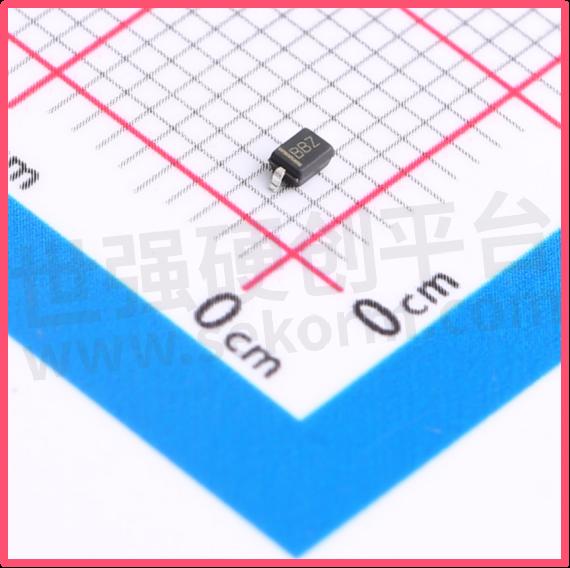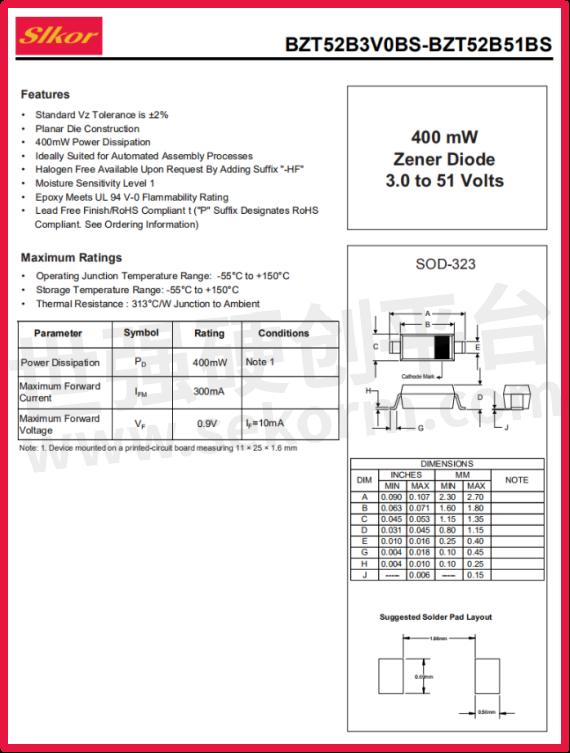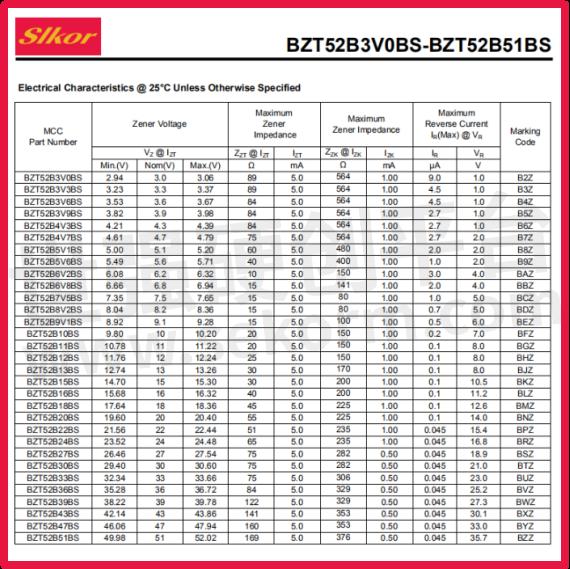Voltage Regulator Diode BZT52B6V8BS: Key Component for Building Stable Circuits

I. Overview
The BZT52B6V8BS Voltage Regulator Diode is a high-performance, high-precision semiconductor device designed for voltage regulation and circuit protection purposes. In electronic devices, voltage regulator diodes play a crucial role in maintaining stable voltage and ensuring the normal operation of circuits. The BZT52B6V8BS is highly regarded in the industry for its excellent technical characteristics.

SLKOR Voltage Regulator Diode BZT52B6V8BS product photo
II. Detailed Technical Features
Regulation Value and Accuracy:
● Nominal Voltage: 6.8V, the stable output voltage provided by the BZT52B6V8BS under normal operating conditions.
● Voltage Regulation Range: 6.66V to 6.94V, allowing for some voltage fluctuation while maintaining circuit stability.
● Accuracy: ±5%, indicating that the deviation of the regulated voltage does not exceed this range under different environmental and operating conditions, ensuring high-precision circuit operation.
Power and Reverse Current:
● Power Dissipation: 400mW, reflecting the maximum power the diode can withstand, an important indicator of its drive capability and durability.
● Reverse Current (Ir): Only 2μA, demonstrating very low leakage current when reverse biased, contributing to reduced power consumption and increased efficiency.

Slkor Voltage Regulator Diode BZT52B6V8BS specification
III. Physical and Material Characteristics
The BZT52B6V8BS voltage regulator diode utilizes advanced semiconductor materials and precise manufacturing processes to ensure the stability and reliability of its physical structure. Its compact packaging design facilitates integration into various electronic devices. Material selection considers thermal stability and electrical performance to meet the demands of different operating environments.

Parameters of Slkor Voltage Regulator Diode BZT52B6V8BS
IV. Application Examples and Considerations
The BZT52B6V8BS is widely used in various electronic devices such as power management, voltage regulators, and protection circuits. When using it, the following points should be noted:
● Ensure that operating voltage and current do not exceed the diode's rated values to prevent damage.
● During layout and wiring, attention should be paid to heat dissipation and electrical isolation to enhance circuit reliability.
● Choose appropriate filtering and bypass capacitors to further optimize circuit performance.
V. Introduction to Key Components Used with BZT52B6V8BS
When constructing circuits using the BZT52B6V8BS voltage regulator diode, it is often necessary to use several other key components to ensure circuit stability and performance. Here are some recommended components and their roles:
Filtering Capacitor:
Purpose: Used to smooth ripple in DC power supplies, reducing the impact of power supply noise on the voltage regulator diode and the entire circuit.
Selection: Capacitor value depends on the ripple magnitude of the power supply and desired filtering effect. Typically, large electrolytic capacitors (ranging from hundreds of microfarads to millifarads) are used for primary filtering, while smaller ceramic capacitors (tens to hundreds of picofarads) are used for further high-frequency filtering.
Bypass Capacitor:
Purpose: Provides a low impedance path to bypass high-frequency noise for the voltage regulator diode, protecting it from high-frequency interference.
Selection: Bypass capacitors are typically small ceramic capacitors with values ranging from tens to hundreds of picofarads, depending on the circuit's operating frequency and noise levels.
Current Limiting Resistor:
Purpose: Limits the current flowing through the voltage regulator diode to prevent damage due to excessive current.
Selection: The resistor value should be chosen based on the diode's rated current and the circuit's operating voltage. Typically, the appropriate resistor value is determined through calculation or experimentation.
Transient Voltage Suppressor (TVS):
Purpose: Used to protect the circuit from transient overvoltages such as lightning strikes or electrostatic discharges.
Selection: TVS selection depends on the circuit's operating voltage and expected transient voltage levels. Its breakdown voltage should be slightly higher than the operating voltage of the voltage regulator diode to ensure no impact on circuit performance under normal operating conditions.
Heat Sink:
Purpose: For voltage regulator diodes with higher power dissipation, attaching a heat sink may be necessary to aid in heat dissipation and prevent damage from overheating.
Selection: Heat sink selection should consider the diode's power dissipation and operating environment temperature. The material and size of the heat sink should provide sufficient dissipation area to ensure the diode operates within a safe temperature range.
These components, working in conjunction with the BZT52B6V8BS voltage regulator diode, can construct a stable and reliable power supply circuit. In practical applications, additional auxiliary components such as fuses and switches may be added according to specific requirements to further enhance circuit functionality and safety.
- +1 Like
- Add to Favorites
Recommend
- The BZT52B3V3BS Zener Diode: Ideal Choice for Low Voltage Regulation
- Zener Diode BZT52B10BS: In-depth Analysis of Technical Characteristics and Applications
- BZT52B11BS Zener Diode: Market Trends and Technological Advancements
- Zener Diode BZT52B15BS: A Reliable Choice for Voltage Regulation
- BZT52B24BS Zener Diode: Leading the Way in 24V Voltage Regulation Solutions
- BZT52B13BS Voltage Regulator Diode: A Technological Star and Market Leader
- Zener Diode BZT52B5V1BS with the Feature of a Nominal Voltage Regulation Value of 5.1V, Achieving An Accuracy of ±5%
- Technical Characteristics and Applications of Zener Diode BZT52B12BS with A Nominal Zener Voltage of 12V
This document is provided by Sekorm Platform for VIP exclusive service. The copyright is owned by Sekorm. Without authorization, any medias, websites or individual are not allowed to reprint. When authorizing the reprint, the link of www.sekorm.com must be indicated.





























































































































































































































































































































































































































































































































































































































































































































































































































































































